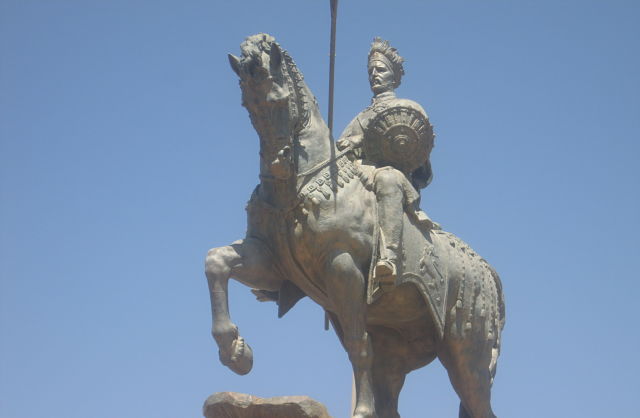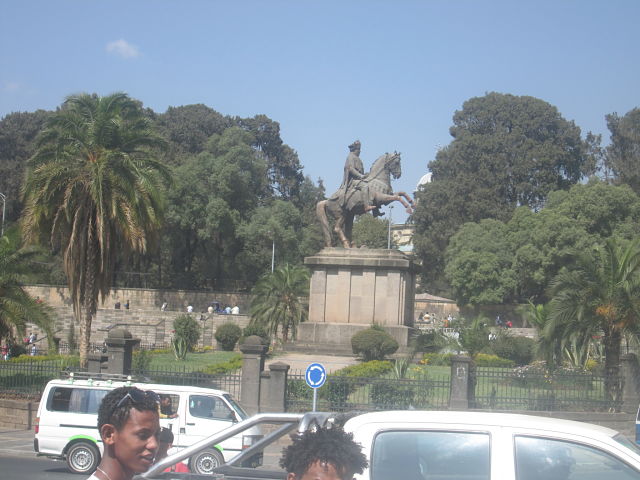 Adwa hero Leul Ras Mekonnen's statue in Harar was renovated about two years ago, yet since then the descriptive letters beneath the statue have been vandalized and the iron fence stolen. (Photo: by A. Bekerie)
Adwa hero Leul Ras Mekonnen's statue in Harar was renovated about two years ago, yet since then the descriptive letters beneath the statue have been vandalized and the iron fence stolen. (Photo: by A. Bekerie)
Tadias Magazine
By Ayele Bekerie, PhD

Updated: Tuesday, March 1st, 2016
This week marks the 120th anniversary of the historic Battle of Adwa
Adwa, Ethiopia (TADIAS) — One hundred twenty years ago, on March 1, 1896 at the battlefield of Adwa, the united Ethiopian army fiercely fought against the colonial army of Italy. By the end of the day, on a Sunday, the Ethiopian army routed the Italian army and as Rubenson eloquently puts it, “the battle-field remained in Ethiopian hands.” Ethiopians continued to live free in an independent state. Moreover, Adwa became the symbol of anti-colonial struggles in Africa. With the decisive defeat of a colonial army, Adwa set the stage for unscrambling Africa. Adwa, as Rubenson correctly puts it, has become a seal of victory. It was a victory that signaled the beginning of the end of the European colonial agenda and operation in Africa.
With victory at Adwa, Ethiopia has become, in the words of the Late Donald Levine, “the bastion of African independence.” Levine writes, “While peoples all over Africa were being subjugated by foreign powers, Ethiopians were winning victories over a series of invaders. From their victories over invading Egyptians in the 1870s, over Sudanese Mahdists in the 1880s, and over Italians in the 1890s, Ethiopians gained a reputation as spirited fighters determined to maintain sovereignty.”
Ethiopian patriots crushed the colonial ambition of the Italian invaders at the Battle of Adwa. The Italians’ desperate attempt to catch up with European colonial powers by completing the mapping of Africa with colonial map has failed. The victory was so decisive; it instantly became a symbol of hope and a concrete foundation for the realization of Pan-African solidarity and institution in Africa. It was the deliberate plan of Europe to colonize the entire continent of Africa with the intent of exploiting its human and natural resources. The beginning of the end of the process of exploitation was ushered when the Ethiopian patriots stopped the Italian colonial ambition at the battlefield of Adwa.
Adwa, therefore, signifies the valiant anti-colonial resistance and liberation of Africans in their immediate history. Adwa also signifies the renaissance and progress of Africa as it projects itself to 2063.
March 1, 2016 is the one hundred twentieth anniversary of the historic battle victory at Adwa. It is therefore a special anniversary. We use the special occasion to give thanks to our valiant patriots who paid extraordinary sacrifices to protect and defend our motherland. We give thanks to our visionary leaders and vow to remember for generations to come their phenomenal accomplishments. We remember the leaders of the gallant forces led by Emperor Menelik II and Empress Taitu Bitul. We evoke the memories of Fitawrari Tekle of Wollega, Sultan Anfari of Afar, Ras Mekonnen of Harar, Ras Mengesha and Ras Alula of Tigray, Negus Teklehaimanot of Gojam, Negus Mikael of Wolo, Dejazmach Wole Bitul of Yeju and numerous other leaders who led the battle to victory. We immediately identify with the 6,000 Ethiopian patriots who gave their lives on the battlefield of Adwa so that we continue to live free. Our dignity and love of country are tied with the over 8,000 Ethiopian patriots who were wounded at the battlefield.
There is no doubt that a seal of victory is achieved at Adwa because of unity and willingness of our people to defend the motherland. Unity was the correct stand then and it should be embraced as a correct stand now for economic, social and political progress. To make an emphasis on unity is not to push for some ideological or what some call chauvinistic agenda. It is indeed to reiterate the historical truth forever recorded at the battlefield of Adwa. It was the united, voluntary and determined Ethiopian army that stopped the colonial ambition of the Italians over our country. Out of Adwa, there emerged a plural people called Ethiopians.

Menelik II Square in Addis Ababa. (Photo: By Ayele Bekerie)
Victory at Adwa has informed the freedom narrative of the new Ethiopia and new Africa, free from colonialism. Adwa has paved the way for Pan-African economic, political and cultural activities. New Ethiopia is a reference to the historic outcome of Adwa. Ethiopians from all corners of the country heeded the call of Emperor Menelik II and marched to Adwa. They fought and died at Adwa. Those who paid the ultimate sacrifice were from the northern and southern parts of the country. They were from the eastern and western part of the country. It was a diverse but united force that expanded the meaning of Ethiopian identity.
By the same token, it is fair to argue that the victory gave rise to a new Africa. It is new because it is a product of the many anti-colonial struggles. It is new because it gave rise to a Pan-African agenda that placed the interests of Africans at center stage.
The issue of who we are has been irreversibly solved at Adwa. A multiethnic and multicultural Ethiopia is our reality for good. Our plurality frames our sense of identity. Out of Adwa rises the importance of shared national identity. The task should be to perfect our diverse but united life and living. The task is also to address grievances and injustices borne out of our long history. The task is to triangulate the individual, ethnic and religious rights by anchoring them to a constitutional framework. The task is to shy away from absolutist tendencies and practices and strive to build a just and democratic society.
Adwa, at present, is engaged in fast and unprecedented urban development. High rise buildings and multilane boulevards are being built changing the face of the historic town. It has come to our attention that some of the new infrastructure may have compromised the historic battlefield sites endangering the plan to register Adwa as a world heritage site. Urban development without heritage conservation at a minimum is tantamount to the desecration of the memories of our martyrs. At a maximum, it is shortsighted, for it irreversibly destroys the required evidence for registering Adwa as a world heritage. It can be argued that the registry has the capacity to bring about sustainable economic benefits to the people of Adwa.
Adwa is a hallowed ground. At Adwa, a decisive and defining battle was fought and won. It is a sacred site that carries the bones and memories of our martyrs. It is a sacred site of immense solidarity and an expression of love of country. The necessity to preserve Adwa’s memory must go hand in hand with its urban development.
One hundred twenty years ago, at a time when the entire African continent was under the dark cloud of European colonialism, Ethiopia turned the darkness into a new bright day. A new day dawned on the majestic and eternal mountains of Adwa. Adwa has become, locally and internationally, a vocabulary of decolonization and independence. Today, Africans are actively planning and implementing their Pan-African present and future in freedom.
Pan-Africanism is no longer a dream. It has become institutionalized and the African Union is an excellent example of what has been achieved so far. The public announcement by the Ethiopian Government to establish a Pan-African University at Adwa to collect, document and publish Adwa’s battle victory together with anti-colonial struggles from the African World will certainly enhance the memories of Adwa. The establishment of the university may also expedite the registration of Adwa as world heritage.
We have overcome many challenges in the past 120 years in our quest to build a progressive nation. We are facing new challenges at present. We are, however, bound to uphold the sanctity of our unity of plurality, informed by historic deeds at the Battle of Adwa, thereby striving to move forward.
—
Ayele Bekerie is an Associate Professor at the Department of History and Heritage Management at Mekelle University.
Related:
119 Years Anniversary of Ethiopia’s Victory at the Battle of Adwa on March 1st, 1896
Reflection on 118th Anniversary of Ethiopia’s Victory at Adwa
The Significance of the 1896 Battle of Adwa
Call for the Registry of Adwa as UNESCO World Heritage Site
Join the conversation on Twitter and Facebook.

























